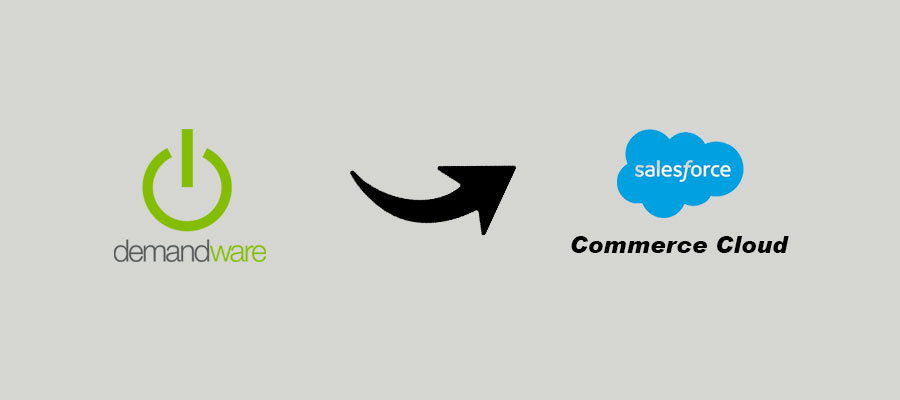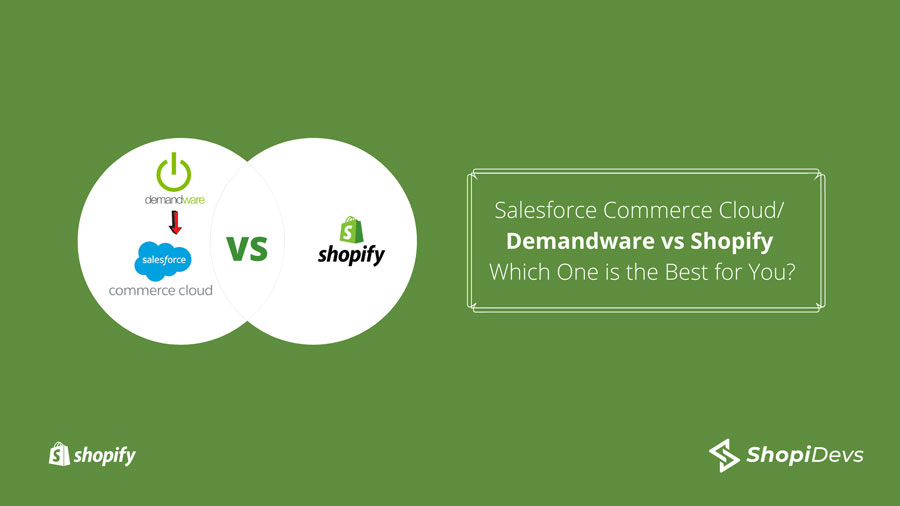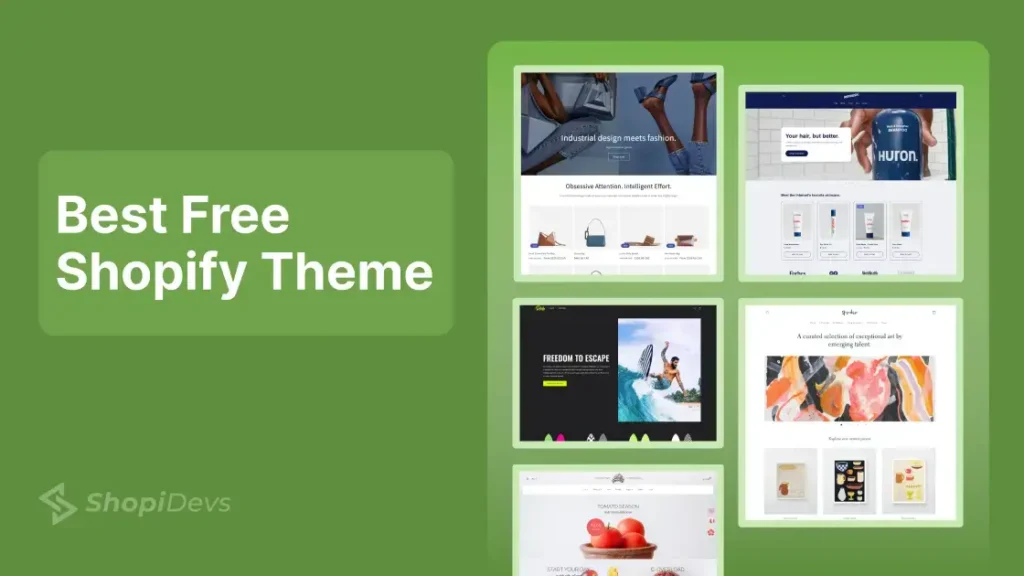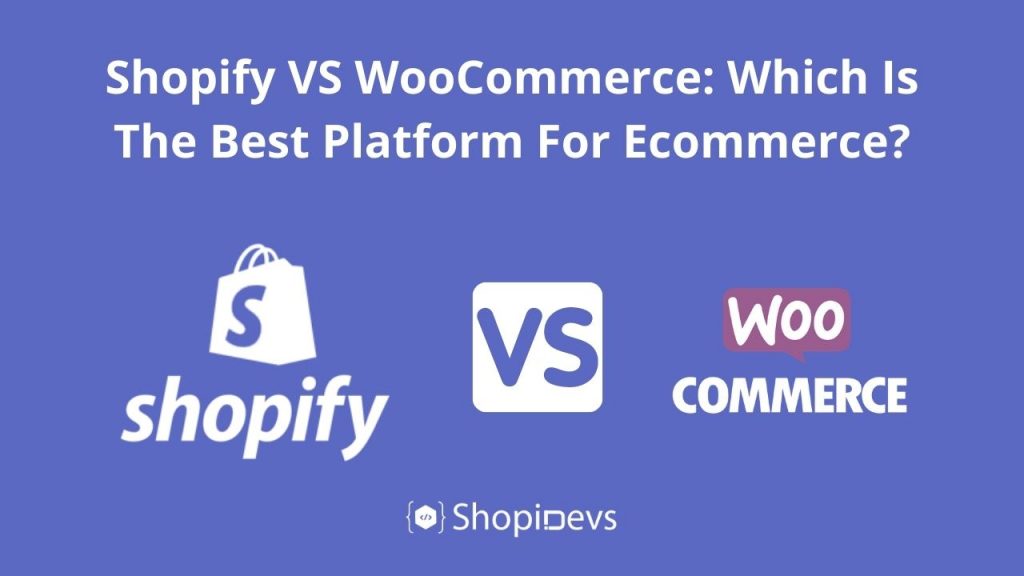Salesforce Commerce Cloud formerly Demandware vs Shopify? Which eCommerce platform is the best for building your online store? Having this thought in your mind is very common if you are planning to start an online store or move your existing one. As a business owner, it may be daunting to pick a platform from these two.
Both Shopify and Demandware offer similar services to the users. These two platforms are well recognized and loved by many people because of their unique features. You will have to choose one depending on what features matter the most for your business. First, Let’s know about these two platforms before knowing the Salesforce Commerce Cloud/ Demandware vs Shopify factors.
What is Demandware?

Salesforce Commerce Cloud-formerly Demandware refers to a cloud-based unified e-commerce platform that has mobile, AI personalization, order management capabilities, and related services for B2B and B2C businesses around the world. The platform was launched in 2005, aiming to provide a hosted service that would help businesses develop and manage easy-to-use, customizable e-commerce websites. Later in 2016, Demandware was acquired by Salesforce, and since then, Demandware has been known as Salesforce Commerce cloud to everyone.
What is Shopify?

Shopify is a SAAS application that allows users to create and maintain eCommerce stores effortlessly. From small businesses to big enterprises, every merchant finds the platform very effective and worthy to build and run their businesses. Especially, those who do not have technical knowledge can easily build and run an online store effortlessly on the Shopify platform.
Shopify was launched in 2004 to provide an eCommerce platform where users will get everything in one place. The facility of Shopify has drawn the attention of businesses from its beginning. As a result, Shopify has become one of the most popular eCommerce platforms for business owners across the world.
Let’s see the difference: Salesforce Commerce Cloud/Demandware vs Shopify
1. Pricing
When it comes to the price of these two platforms, Shopify is far more affordable than Demandable. In Demandware, you have to pay the license fee based on the commission on your online sales. They called the model “Shared Success,” where the more you will earn, the more you will charge. The commission rate may vary from 0.75%-1.25% or more.
You will see various price plans for four different fields Sales, Service, Marketing, and Work.com. Each of them has different pricing as well. You can also take other plans based on different purposes and targets like analytics, businesses, platforms, etc. So, price is one of the crucial factors in Salesforce Commerce Cloud/Demandware vs Shopify.
On the contrary, Shopify has subscription-based pricing plans that can be very useful for businesses of different levels. You can start with a $29 per month plan and any others from their pricing plans. You can also choose Shopify Plus for your enterprise-leveled business, where the price starts from $2000. You can also launch your dream business using Shopify Lite, paying only $9 per month.
2. Store Customization
Demandware gives users less freedom when it comes to customizing your online store. You need to get approval for any major site customizations. You can also find in place restrictions that may seem a little disturbing for you. Demandware may not be the platform you want if you look for total freedom of store customization.
In both Shopify and Shopify Plus, the users get complete control to customize their store. The experience will be much better if you use Shopify Plus, where you will receive more features and flexibility to customize your stores. In Shopify, you will find free & paid themes that you can use to customize your store according to your specific niche.
For example, If you are planning to build an online Shopify store, you have two options. First, you can choose a niche-specific theme such as Brator to create a store for selling auto parts, or you can choose a multipurpose theme such as Kalles to design your store according to your preference.
3. Ease of Use
Setting up the Demandware is very simple as the users have less customization facility. You are still able to customize your store and give your customers a personalized shopping experience with data points and analytics.
Setting up the Shopify store is also easy, but here you will get more freedom than the Demandware. You will find everything in all places when you are using the Shopify platform. Moreover, you will find free & paid apps available on the platform that will make your journey easier.
4. Integration Capability
In Demandware, you will be able to integrate common third-party integration such as Dropbox, MailChimp, Activecampain, G suit, and many more. These integrations help you to use powerful tools to fuel up productivity, marketing, sales, etc.
On the other side, Shopify took the integration facility to the next level. At present, You will get more than 6000 apps are available in the Shopify store to elevate the performance of your online store. Popular apps such as Slider Revolution, MailChimp are also available on the Shopify platform.
5. Popularity
Although both platforms are popular among business owners, Shopify has more users than Demandware. Demandware is powering up more than 150,000 online stores around the world, where Shopify has more than 1.59 million websites. At present, it’s one of the most popular platforms having a 23 percent market share in the USA. The popularity of these CMS’s or users might be a considerable factor of Salesforce Commerce Cloud/Demandware vs Shopify.
6. Community
Both Demandware and Shopify have communities where you can find solutions and advice from experts. Where Demandware has hundreds of developers, Shopify has thousands of developers who make the community more supportive. Moreover, there are many Shopify experts out there to help you with any kind of store customization or promotional activities as well.
7. Mobile Capabilities
Demandware and Shopify are both really great for mobile capabilities. You can easily make a mobile site easily using any of these platforms. You do not need to use any third-party app or customization to make your site mobile-friendly.
This is an important feature to consider as most of your customers may use mobile devices to browse your online store. Ensuring a great shopping experience for your customers is a must if you want to do well with your business.
8. Customer Support
Although both of the platforms have 24/7 customer support through chat, call, or mail, the difference you may notice is in their response time. According to many customers, the response of customer support of Demandware takes more time than the Shopify customer support. When you are running your online store on the platform, having quick and effective customer support may be an important factor to consider for you.
Finally, Considering the above-mentioned Salesforce Commerce Cloud/Demandware vs Shopify factors, you can easily make a decision. You should find a match between your requirements and the features of the platform so that you will be able to pick the best suitable eCommerce platform for your business.
You may also read: 5 Best Shopify Plus Alternatives You Must Know
I’m a digital marketing expert and mobile app developer with a deep understanding of Shopify App Store optimization. I contribute insightful articles on Shopify to help businesses thrive online.



